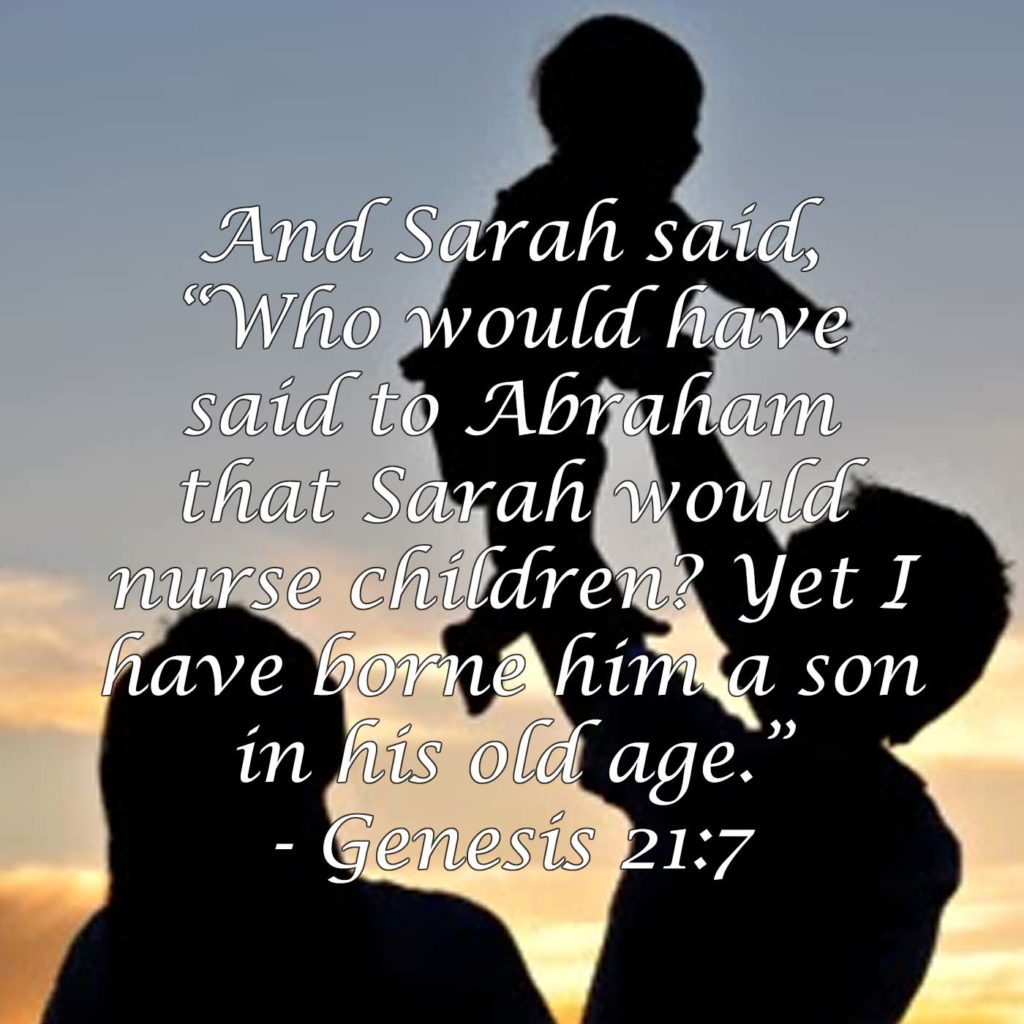
1 The LORD visited Sarah as he had said, and the LORD did to Sarah as he had promised.
I find it interesting that the text says that God visited Sarah. The word “visited” differs from the more commonly used word “appeared.” Often times in Scripture when God appears someone, He usually says something, and a conversation is recorded. Here, when God visits, no conversation is recorded, and instead Sarah’s womb is opened, and she is able to conceive. This suggests that God’s visitation might not have needed words or a conversation, but simply His presence allowed for the miraculous conception to happen.
2 And Sarah conceived and bore Abraham a son in his old age at the time of which God had spoken to him. 3 Abraham called the name of his son who was born to him, whom Sarah bore him, Isaac.
According to God’s promise, Sarah gives birth to a son, Abraham names the child Isaac, which means laughter. This is the same name that God had originally commanded Abraham to call the child back when the covenant of circumcision was established.
4 And Abraham circumcised his son Isaac when he was eight days old, as God had commanded him.
In accordance with the covenant between God and Abraham, Abraham circumcises Isaac when he is eight days old. This pattern will be followed by all of Abraham’s descendants.
5 Abraham was a hundred years old when his son Isaac was born to him.
True to pattern, The text lists how Old Abraham was at the time of the birth of his heir. Abraham was 86 at the birth of Ishmael, and now fourteen years later, Isaac is born.
6 And Sarah said, “God has made laughter for me; everyone who hears will laugh over me.” 7 And she said, “Who would have said to Abraham that Sarah would nurse children? Yet I have borne him a son in his old age.”
Sarah reflects on the joy that Isaac brings, reminiscing on the meaning of his name, laughter. Perhaps she recalls how she laughed in disbelief when she first heard God promise to give her a child. Now she laughs for joy at what God has done.
8 And the child grew and was weaned. And Abraham made a great feast on the day that Isaac was weaned.
The text is not clear how old Isaac was when he was weaned. He could have been anywhere from 1-4 years old. When he finally is pushed to eat solid food, Abraham celebrates with a feast, possibly providing a large range of dishes for the child to try.
9 But Sarah saw the son of Hagar the Egyptian, whom she had borne to Abraham, laughing.
Sarah’s old grudge with Hagar comes to light once again. She sees the teenager Ishmael laughing, or as some versions say “mocking”, perhaps making fun of Isaac. It provokes her to anger.
10 So she said to Abraham, “Cast out this slave woman with her son, for the son of this slave woman shall not be heir with my son Isaac.” 11 And the thing was very displeasing to Abraham on account of his son.
Sarah approaches Abraham and tells her to get rid of Hagar and Ishmael, since Isaac is the rightful heir. Perhaps there is a fear that Ishmael would kill Isaac and take the inheritance for himself. Now Abraham does not like the sound of tossing Hagar and Ishmael to the wind. Ishmael is still his son, and he still loves Ishmael.
12 But God said to Abraham, “Be not displeased because of the boy and because of your slave woman. Whatever Sarah says to you, do as she tells you, for through Isaac shall your offspring be named. 13 And I will make a nation of the son of the slave woman also, because he is your offspring.”
Abraham, in frustration and unsure of what to do turns to God, and God answers him, telling him to listen to Sarah, Isaac after all will continue with God’s covenant. God also reassures Abraham, saying that he will bless and provide for Ishmael to grow into a great nation as well.
14 So Abraham rose early in the morning and took bread and a skin of water and gave it to Hagar, putting it on her shoulder, along with the child, and sent her away. And she departed and wandered in the wilderness of Beersheba.
Abraham listens to God and Sarah, and prepares to send Hagar and Ishmael away. He gives them rations of food and water for their journey, a loaf of bread and a skin of water, enough for a short days trip. However it seems they got lost and end up wandering in the region of Beersheba, a desert area in southern Canaan.
15 When the water in the skin was gone, she put the child under one of the bushes. 16 Then she went and sat down opposite him a good way off, about the distance of a bowshot, for she said, “Let me not look on the death of the child.” And as she sat opposite him, she lifted up her voice and wept.
When they run out of water, it becomes clear that they might not make it. Teenaged Ishmael might of fainted, and Hagar hides him in the shade. She thinks he will die from thirst and she does not want to watch him die so she finds another place to wait for the end. She begins to weep.
17 And God heard the voice of the boy, and the angel of God called to Hagar from heaven and said to her, “What troubles you, Hagar? Fear not, for God has heard the voice of the boy where he is. 18 Up! Lift up the boy, and hold him fast with your hand, for I will make him into a great nation.”
Apparently Ishmael also begins to cry out for help, his mother having left him. and God answers them. This is the second time God has reached out to protect Hagar and her son. God reminds Hagar that he promised to make Ishmael into a great nation.
19 Then God opened her eyes, and she saw a well of water. And she went and filled the skin with water and gave the boy a drink.
God reveals a well, or a spring, or water to Hagar, and she quickly fills up the water skin and returns to Ishmael. This quick refreshment is all they needed.
20 And God was with the boy, and he grew up. He lived in the wilderness and became an expert with the bow. 21 He lived in the wilderness of Paran, and his mother took a wife for him from the land of Egypt.
While Isaac inherited God’s covenant and promise, God was also with Ishmael throughout his life. Ishmael never settles in a city, but lives as a hunter in the wilderness, eventually ending up in Paran, modern day Arabia. He is in fact the ancestor of the Arabs. Hagar of course finds him a wife from Egypt, her homeland.
22 At that time Abimelech and Phicol the commander of his army said to Abraham, “God is with you in all that you do. 23 Now therefore swear to me here by God that you will not deal falsely with me or with my descendants or with my posterity, but as I have dealt kindly with you, so you will deal with me and with the land where you have sojourned.” 24 And Abraham said, “I will swear.”
Shortly after Isaac is weaned Abimelech, along with his general, approach Abraham. Abimelech has been watching Abraham, keeping an eye on the prophet who nearly killed and then saved his people. Now that he has a son in his old age, Abimelech recognized that God truly is with Abraham. He wants Abraham to promises to be nice to him and his descendants. Abraham agrees, and this officially forms a lasting friendship between the two.
25 When Abraham reproved Abimelech about a well of water that Abimelech’s servants had seized, 26 Abimelech said, “I do not know who has done this thing; you did not tell me, and I have not heard of it until today.”
As part of the treaty between the two, Abraham does mention a grievance he had with some of Abimelech’s subjects, who seized a well that Abraham had dug. However, Abimelech was not aware of the situation. The tone in which he replies suggests that he is taking Abrahams side in the dispute, and wants to set thing right.
27 So Abraham took sheep and oxen and gave them to Abimelech, and the two men made a covenant. 28 Abraham set seven ewe lambs of the flock apart. 29 And Abimelech said to Abraham, “What is the meaning of these seven ewe lambs that you have set apart?” 30 He said, “These seven ewe lambs you will take from my hand, that this may be a witness for me that I dug this well.” 31 Therefore that place was called Beersheba, because there both of them swore an oath.
To make things right, Abraham offers Abimelech seven sheep, proof that he dug the well himself, by accepting these sheep Abimelech would officially recognize the well as Abraham’s. It seems this is a foreign custom to Abimelech. While he knows that the giving of gifts can signify a lot of things, as he had done a similar thing for Abraham and Sarah in the previous chapter, he needed clarification for what Abraham was doing. In doing so both of the men made an oath. Abraham swore to deal kindly with Abimelech and his descendants, and Abimelech swore to recognize the well, Beersheba (well of oaths), as belonging to Abraham.
32 So they made a covenant at Beersheba. Then Abimelech and Phicol the commander of his army rose up and returned to the land of the Philistines.
Abimelech and his general return to the coastal plains by the Mediterranean sea, probably the area known as Gaza, or what would be known as the land of the philistines. It is odd that the philistines are mentioned here, as they did not appear in the land for several centuries later. The people group more commonly known as the Philistines likely conquer the land belonging to Abimelech and his descendants.
33 Abraham planted a tamarisk tree in Beersheba and called there on the name of the LORD, the Everlasting God. 34 And Abraham sojourned many days in the land of the Philistines.
While in Beersheba, Abraham plants a tree, and again begins to worship God in this place. Perhaps by planting a tree, he is reminded of the oak of Moreh and the oaks of Mamre that he used to worship God beside. He stays in this land, again called the land of the philistines, for quite some time.
The Holy Bible: English Standard Version. (2016). (Ge 21:1–34). Wheaton, IL: Crossway Bibles.
